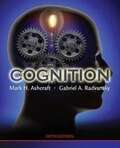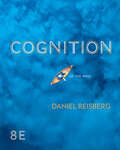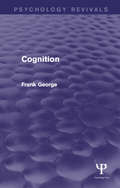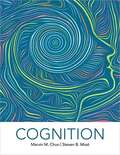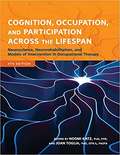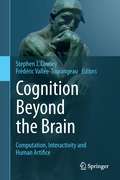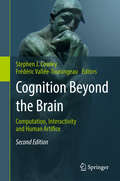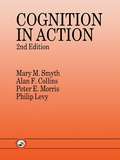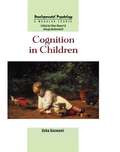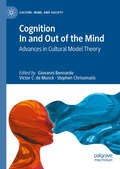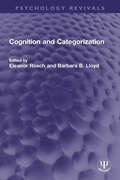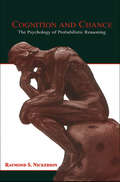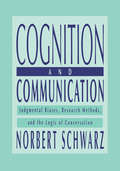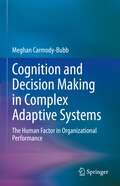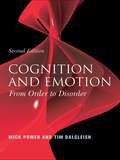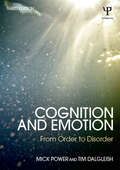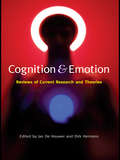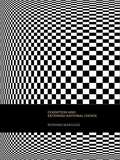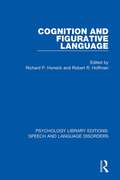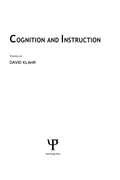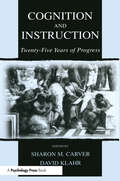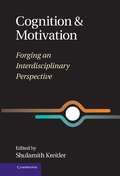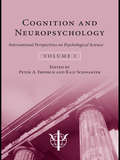- Table View
- List View
Cognition (5th edition)
by Mark H. Ashcraft Gabriel A. RadvanskyFor undergraduate level psychology courses in Cognition and Theories of Learning. The psychology of human memory and cognition is fascinating, dealing with questions and ideas that are inherently interesting, such as how we think, reason, remember, and use language. Using a first person narrative, posing direct questions to the reader, and balancing classic research with cutting edge topics, the author draws in the reader and conveys the excitement of the field. Reflecting the increasing use of new technologies to study memory and cognition, Ashcraft and the new co-author, Gabriel Radvansky, continue to integrate sections on neurosciences within individual chapter topics.
Cognition (Eighth Edition): Exploring The Science Of The Mind
by Daniel ReisbergAn interactive and applied approach to studying cognition. With new digital tools for retrieval practice and active learning, the Eighth Edition is more effective and engaging than ever. Four exciting features deliver a dynamic, interactive introduction to cognitive psychology today: New InQuizitive science-based adaptive assessment A pedagogical program based on the “testing effect” New ZAPS 3.0 Interactive Labs Author-created Norton Teaching Tools and a new online Applying Cognitive Psychology reader
Cognition (Psychology Revivals)
by Frank H. GeorgeOriginally published in 1962, the problems of cognition dealt with in this book include learning, perception, thinking, memory and linguistic behaviour. It is not a textbook in the ordinary sense, since it presents a particular approach to the subject through experimental psychology, and also, to some extent, through philosophy, cybernetics and logic. A brief mention is made of ethological and physiological matters. It argues that cognition is a stepping-stone to integration with allied sciences. A large-scale study of the organism-as-a-whole needs to be supplemented by other biological and logical studies, but preparatory to this, cognitive psychologists must try and discover more rigorous ways of presenting their theories and models, since the mode of communicating an idea can never be wholly separated from that idea. Furthermore cognition, even at the organism-as-a-whole level, needs to broaden out and link up with social studies and studies in personality and individual difference. This book, pointed to a new direction that psychology should take; without contributing greatly to existing knowledge in the obvious sense, it suggests new methods and new ways of regarding the existing knowledge at the time.
Cognition (Sinauer Series)
by Marvin Chun Steven MostChun and Most's Cognition brings new, modern vitality to course materials by presenting exciting findings from cognitive psychology in a way that students can easily grasp. Highlighting everyday-life applications, Cognition motivates students to share in the excitement of cognitive psychology through highly relevant examples, discussions, and demonstrations. Its engaging prose and pedagogical features, such as "Think for Yourself" and "See for Yourself," immerse students in the process of scientific discovery. <p><p> This comprehensive text presents both classic and contemporary research, emphasizing conceptual understanding and lifelong discovery. In addition, the authors integrate exciting new topic areas such as emotion and highlight essential connections to social, clinical, and developmental psychology. A robust multimedia package extends discovery through high-quality demonstrations (Discovery Labs), videos, and quizzing tools to help students succeed. Cognition and its accompanying resources, including the test bank, can be integrated directly into instructors' learning management systems to save time and simplify access.
Cognition And Occupation Across The Lifespan: Neuroscience, Neurorehabilitation And Models Of Intervention In Occupational Therapy
by Noomi KatzOccupational therapy clinicians have the knowledge and skills to address the consequences of cognitive, neurological, and executive dysfunctions that can result from aging, illness, brain injury, stroke, or neurodevelopmental disorder. Practitioners can guide people facing neurological dysfunction to gain the skills they need to participate in family, work, and community life. The fourth edition of Cognition, Occupation, and Participation Across the Lifespan not only updates the information from previous edition, but also has expanded content, including 9 new chapters, a new section on children and adolescents, and content on topics includiong ethical considerations, consumer technologies, and development of cognition and executive functions. Providing intervention models grounded in neuroscience and occupation, this comprehensive new edition of the best-seller examines current evidence and best practices for working with clients across the lifespan. Cognitive models include theoretical basis, evaluation and intervention processes, and evidence to help clinicians teach clients processing strategies that use their assets to achieve successful occupational performance and participation. Chapters include key terms and concepts, learning objectives, case examples, and a summary of key points.
Cognition Beyond the Brain: Computation, Interactivity and Human Artifice
by Stephen J. Cowley Frédéric Vallée-TourangeauCognition Beyond the Brain challenges neurocentrism by advocating a systemic view of cognition based on investigating how action shapes the experience of thinking. The systemic view steers between extended functionalism and enactivism by stressing how living beings connect bodies, technologies, language and culture. Since human thinking depends on a cultural ecology, people connect biologically-based powers with extended systems and, by so doing, they constitute cognitive systems that reach across the skin. Biological interpretation exploits extended functional systems. Illustrating distributed cognition, one set of chapters focus on computer mediated trust, work at a construction site, judgement aggregation and crime scene investigation. Turning to how bodies manufacture skills, the remaining chapters focus on interactivity or sense-saturated coordination. The feeling of doing is crucial to solving maths problems, learning about X rays, finding an invoice number, or launching a warhead in a film. People both participate in extended systems and exert individual responsibility. Brains manufacture a now to which selves are anchored: people can act automatically or, at times, vary habits and choose to author actions. In ontogenesis, a systemic view permits rationality to be seen as gaining mastery over world-side resources. Much evidence and argument thus speaks for reconnecting the study of computation, interactivity and human artifice. Taken together, this can drive a networks revolution that gives due cognitive importance to the perceivable world that lies beyond the brain. Cognition Beyond the Brain is a valuable reference for researchers, practitioners and graduate students within the fields of Computer Science, Psychology, Linguistics and Cognitive Science.
Cognition Beyond the Brain: Computation, Interactivity and Human Artifice
by Stephen J. Cowley Frédéric Vallée-TourangeauThis book challenges neurocentrism by advocating a systemic view of cognition based on investigating how action shapes the experience of thinking, placing interactivity at its heart. This systemic viewpoint makes three main claims. First, that many elaborate cognitive skills like language, problem solving and human-computer interaction (HCI) are based in sense-saturated coordination or interactivity. Second, interactivity produces a tightly woven scaffold of resources, some internal to the agent and others external, that elevates and transforms thinking. Third, human agents entwine brains, bodies and their surroundings as they manage multi-scalar dynamics. This new edition continues to demonstrate how a systemic perspective casts a productive light on thinking in applied domains such as crime scene analysis, the use of information technology in construction, and computer-meditated trusts and presents new studies on the cognitive ecology of the web, multi-scalar temporal and organisational cognition and the importance of interactive material engagement in digital architecture. Authors use various scales of the systemic viewpoint to illustrate how bodies and artefacts shape thinking, but in all cases the experience of materiality is meshed with activity that involves the world beyond the body. Cognition Beyond the Brain is a valuable reference for researchers, practitioners and graduate students within the fields of Computer Science, Psychology, Linguistics and Cognitive Sciences.
Cognition In Action
by Alan F. Collins Peter E. Morris Philip Levy Mary M. SmythThis revised textbook is designed for undergraduate courses in cognitive psychology. It approaches cognitive psychology by asking what it says about how people carry out everyday activities: how people organize and use their knowledge in order to behave appropriately in the world in which they live.; Each chapter of the book starts with an example and then uses this to introduce some aspect of the overall cognitive system. Through such examples of cognition in action, important components of the cognitive system are identified, and their interrelationships highlighted. Thus the text demonstrates that each part of the cognitive system can only be understood properly in its place in the functioning of the whole.; This edition features increased coverage of neuropsychological and connectionist approaches to cognition.
Cognition In Children (Developmental Psychology: A Modular Course)
by Usha GoswamiThis textbook aims to provide a selective, but representative, review of work in cognitive development, grouped around themes that are familiar from textbooks of adult cognition. The book focuses on the question of what develops, rather than on why it develops. The findings of a given experimental study what develops are generally fixed, but the interpretation of what particular findings mean why is fluid. Some of the experiments discussed in this book have alternative explanations, and every student interested in children's cognition is invited to develop their own ideas about what different studies mean.
Cognition In The Wild (Bradford Books)
by Edwin Hutchins<P>Edwin Hutchins combines his background as an anthropologist and an open ocean racing sailor and navigator in this account of how anthropological methods can be combined with cognitive theory to produce a new reading of cognitive science. <P>His theoretical insights are grounded in an extended analysis of ship navigation -- its computational basis, its historical roots, its social organization, and the details of its implementation in actual practice aboard large ships. The result is an unusual interdisciplinary approach to cognition in culturally constituted activities outside the laboratory -- "in the wild."
Cognition In and Out of the Mind: Advances in Cultural Model Theory (Culture, Mind, and Society)
by Victor C. de Munck Giovanni Bennardo Stephen ChrisomalisThis edited collection presents an agenda for the interdisciplinary study of anthropology and cognitive science. It consists of fifteen chapters written by international experts on the relationship between culture and cognition. This volume is unique in that it includes both inside (i.e., shared mental templates) and outside (i.e., extended, embedded, enactive and ecological) theories of cognition. The contributors come from the diverse disciplinary fields of anthropology, linguistics, archaeology, and cognitive science. The aim is to investigate the mental production of shared knowledge, goals, and desires around which human social life revolves. The coverage spans cultural and linguistic evolution, the importance of local histories, and the role of cultural models to understand and interact with the world. Drawing on cultural model theory, this volume is an invaluable resource for linguists, cognitive scientists, anthropologists, and other social scientists willing to explore and understand how the sharedness of culture can bond us all together across relative cultural differences and (mis)perceived divisions.
Cognition and Categorization (Psychology Revivals)
by Eleanor Rosch Barbara B. LloydOriginally published in 1978, the papers in this book derive from a 1976 meeting sponsored by the Social Science Research Council to discuss the nature and principles of category formation. It is organized in three sections: real-world categories, the cognitive processes underlying categorization, and the nature of representation. Part I examines different structural aspects of real-world categories: folk biological taxonomies, within and between category structures for material objects, and some categories in a language that codes the world in a visual–gestural mode. All three chapters in Part I assume category processors who are able to perform at least three cognitive functions: They can judge similarity between stimuli; they can perceive and process the attributes of a stimulus; and they can learn. Part II presents analyses of these three cognitive functions. All discussion of psychological structures and processes lead eventually to the issue of representation, and Part III examines representational assumptions underlying the earlier discussions. Today it can be read and enjoyed in its historical context.
Cognition and Chance: The Psychology of Probabilistic Reasoning
by Raymond S. NickersonLack of ability to think probabilistically makes one prone to a variety of irrational fears and vulnerable to scams designed to exploit probabilistic naiveté, impairs decision making under uncertainty, facilitates the misinterpretation of statistical information, and precludes critical evaluation of likelihood claims. Cognition and Chance presents an overview of the information needed to avoid such pitfalls and to assess and respond to probabilistic situations in a rational way. Dr. Nickerson investigates such questions as how good individuals are at thinking probabilistically and how consistent their reasoning under uncertainty is with principles of mathematical statistics and probability theory. He reviews evidence that has been produced in researchers' attempts to investigate these and similar types of questions. Seven conceptual chapters address such topics as probability, chance, randomness, coincidences, inverse probability, paradoxes, dilemmas, and statistics. The remaining five chapters focus on empirical studies of individuals' abilities and limitations as probabilistic thinkers. Topics include estimation and prediction, perception of covariation, choice under uncertainty, and people as intuitive probabilists. Cognition and Chance is intended to appeal to researchers and students in the areas of probability, statistics, psychology, business, economics, decision theory, and social dilemmas.
Cognition and Communication: Judgmental Biases, Research Methods, and the Logic of Conversation (Distinguished Lecture Series #Vol. 1996)
by Norbert SchwarzPsychological research into human cognition and judgment reveals a wide range of biases and shortcomings. Whether we form impressions of other people, recall episodes from memory, report our attitudes in an opinion poll, or make important decisions, we often get it wrong. The errors made are not trivial and often seem to violate common sense and basic logic. A closer look at the underlying processes, however, suggests that many of the well known fallacies do not necessarily reflect inherent shortcomings of human judgment. Rather, they partially reflect that research participants bring the tacit assumptions that govern the conduct of conversation in daily life to the research situation. According to these assumptions, communicated information comes with a guarantee of relevance and listeners are entitled to assume that the speaker tries to be informative, truthful, relevant, and clear. Moreover, listeners interpret the speakers' utterances on the assumption that they are trying to live up to these ideals. This book introduces social science researchers to the "logic of conversation" developed by Paul Grice, a philosopher of language, who proposed the cooperative principle and a set of maxims on which conversationalists implicitly rely. The author applies this framework to a wide range of topics, including research on person perception, decision making, and the emergence of context effects in attitude measurement and public opinion research. Experimental studies reveal that the biases generally seen in such research are, in part, a function of violations of Gricean conversational norms. The author discusses implications for the design of experiments and questionnaires and addresses the socially contextualized nature of human judgment.
Cognition and Decision Making in Complex Adaptive Systems: The Human Factor in Organizational Performance
by Meghan Carmody-BubbThis book explains the role of human behavior research, from both a historical and modern perspective, in improving objective, measurable performance outcomes to include safety, strategic decision making, and organizational performance. The book builds upon empirically supported foundations of human cognition, but with a focus on applying this knowledge in a manner that can improve human decision-making to enhance safety and performance. It includes explanations of how the human mind processes information, including differences in novice versus expert information processing, and tools to combat various cognitive biases. Explained within the framework of complex adaptive systems, this book builds upon resources developed through the author’s years of combined applied research and graduate teaching and includes chapters on the roles of uncertainty and complexity within scientific research. Finally, the book offers tools that are rooted in empirical research and demonstrated within the context of contemporary, real-world scenarios, with a focus on improving organizational effectiveness through improved strategic decision making and the development of learning cultures within organizations.
Cognition and Emotion: From Order to Disorder
by Mick Power Tim DalgleishThe relationship between thinking and feeling has puzzled philosophers for centuries, but more recently has become a dominant focus in psychology and in the brain sciences. This second edition of the highly praised Cognition and Emotion examines everything from past philosophical to current psychological perspectives in order to offer a novel understanding of both normal emotional experience and the emotional disorders. The authors integrate work on normal emotions with work on the emotional disorders. Although there are many influential theories of normal emotions within the cognition and emotion literature, these theories rarely address the issue of disordered emotions. Similarly, there are numerous theories that seek to explain one or more emotional disorders (e.g., depression, post-traumatic stress disorder, and phobias), but which rarely discuss normal emotions. The present book draws these separate strands together and introduces a theoretical framework that can be applied to both normal and disordered emotions. It also provides a core cognition and emotion textbook through the inclusion of a comprehensive review of the basic literature. The book includes chapters on the historical background and philosophy of emotion, reviews the main theories of normal emotions and of emotional disorders, and includes separate chapters organised around the five basic emotions of fear, sadness, anger, disgust, and happiness. Cognition and Emotion: From Order to Disorder provides both an advanced textbook for undergraduate and postgraduate courses in addition to a novel approach with a range of implications for clinical practice for work with the emotional disorders.
Cognition and Emotion: From order to disorder
by Mick Power Tim DalgleishThis fully updated third edition of the highly praised Cognition and Emotion provides a comprehensive overview of contemporary research on both normal emotional experience and the emotional disorders. The book provides a comprehensive review of the basic literature on cognition and emotion – it describes the historical background and philosophy of emotion, reviews the main theories of normal emotions and emotional disorders, and the research on the five basic emotions of fear, anger, sadness, anger, disgust and happiness. The authors provide a unique integration of two areas which are often treated separately: the main theories of normal emotions rarely address the issue of disordered emotions, and theories of emotional disorders (e.g. depression, post-traumatic stress disorder, and phobias) rarely discuss normal emotions. The book draws these separate strands together, introducing a theoretical framework that can be applied to both normal and disordered emotions. Cognition and Emotion provides both an advanced textbook for undergraduate and postgraduate courses in addition to a novel approach with a range of implications for clinical practice for work with the emotional disorders.
Cognition and Emotion: Reviews of Current Research and Theories
by Jan De HouwerEmotions are complex and multifaceted phenomena. Although they have been examined from a variety of perspectives, the study of the interaction between cognition and emotion has always occupied a unique position within emotion research. Many philosophers and psychologists have been fascinated by the relationship between thinking and feeling. During the past 30 years, research on the relationship between cognition and emotion has boomed and so many studies on this topic have been published that it is difficult to keep track of the evidence. This book fulfils the need for a review of the existing evidence on particular aspects of the interplay between cognition and emotion. The book assembles a collection of state-of-the-art reviews of the most important topics in cognition and emotion research: emotion theories, feeling and thinking, the perception of emotion, the expression of emotion, emotion regulation, emotion and memory, and emotion and attention. By bringing these reviews together, this book presents a unique overview of the knowledge that has been generated in the past decades about the many and complex ways in which cognition and emotion interact. As such, it provides a useful tool for both students and researchers alike, in the fields of social, clinical and cognitive psychology.
Cognition and Extended Rational Choice
by Howard MargolisOne of the most exciting recent innovations in the social sciences has been the emergence of 'behaviour economics', which extends the notion of rational choice to allow for both motivation beyond self-interest and intuitions that cannot be reduced to the logic of a situation. This new book by Howard Margolis demonstrates how an account of widely-di
Cognition and Figurative Language (Psychology Library Editions: Speech and Language Disorders)
by Robert R. Hoffman Richard P. HoneckOriginally published in 1980, this is a book about the psychology of figurative language. It is however, eclectic and therefore should be of interest to professionals and students in education, linguistics, philosophy, sociolinguistics, and other concerned with meaning and cognition. The editors felt there was a pressing need to bring together the growing empirical efforts of this topic. In a sense, recognition of the theoretical importance of figurative language symbolized the transition from the psycholinguistics of the 1960s to that of the late 1970s, that is from a linguistic semantics to a more comprehensive psychological semantics with a healthy respect for context, inference, world knowledge, and above all creative imagination. The organization of the volume reflects the more basic, general concerns with cognition – from historical and philosophical background, through problems of mental representation and semantic theory, to developmental trends, and to applications in problem solving.
Cognition and Instruction: Twenty-five Years Of Progress (Carnegie Mellon Symposia on Cognition Series)
by David KlahrFirst published in 1987. Routledge is an imprint of Taylor & Francis, an informa company.
Cognition and Instruction: Twenty-five Years of Progress (Carnegie Mellon Symposia on Cognition Series)
by Sharon M. Carver David KlahrThis volume is based on papers presented at the 30th Carnegie Mellon Symposium on Cognition. This particular symposium was conceived in reference to the 1974 symposium entitled Cognition and Instruction. In the 25 years since that symposium, reciprocal relationships have been forged between psychology and education, research and practice, and laboratory and classroom learning contexts. Synergistic advances in theories, empirical findings, and instructional practice have been facilitated by the establishment of new interdisciplinary journals, teacher education courses, funding initiatives, and research institutes. So, with all of this activity, where is the field of cognition and instruction? How much progress has been made in 25 years? What remains to be done? This volume proposes and illustrates some exciting and challenging answers to these questions. Chapters in this volume describe advances and challenges in four areas, including development and instruction, teachers and instructional strategies, tools for learning from instruction, and social contexts of instruction and learning. Detailed analyses of tasks, subjects' knowledge and processes, and the changes in performance over time have led to new understanding of learners' representations, their use of multiple strategies, and the important role of metacognitive processes. New methods for assessing and tracking the development and elaboration of knowledge structures and processing strategies have yielded new conceptualizations of the process of change. Detailed cognitive analysis of expert teachers, as well as a direct focus on enhancing teachers' cognitive models of learners and use of effective instructional strategies, are other areas that have seen tremendous growth and refinement in the past 25 years. Similarly, the strong impact of curriculum materials and activities based on a thorough cognitive analysis of the task has been extended to the use of technological tools for learning, such as intelligent tutors and complex computer based instructional interfaces. Both the shift to conducting a significant portion of the cognition and instruction research in real classrooms and the increased collaboration between academics and educators have brought the role of the social context to center stage.
Cognition and Intractability: A Guide to Classical and Parameterized Complexity Analysis
by Iris van Rooij Mark Blokpoel Johan Kwisthout Todd WarehamIntractability is a growing concern across the cognitive sciences: while many models of cognition can describe and predict human behavior in the lab, it remains unclear how these models can scale to situations of real-world complexity. Cognition and Intractability is the first book to provide an accessible introduction to computational complexity analysis and its application to questions of intractability in cognitive science. Covering both classical and parameterized complexity analysis, it introduces the mathematical concepts and proof techniques that can be used to test one's intuition of (in)tractability. It also describes how these tools can be applied to cognitive modeling to deal with intractability, and its ramifications, in a systematic way. Aimed at students and researchers in philosophy, cognitive neuroscience, psychology, artificial intelligence, and linguistics who want to build a firm understanding of intractability and its implications in their modeling work, it is an ideal resource for teaching or self-study.
Cognition and Motivation
by Shulamith KreitlerThis collection examines the many internal and external factors affecting cognitive processes. Editor Shulamith Kreitler brings together a wide range of international contributors to produce an outstanding assessment of recent research in the field. These contributions go beyond the standard approach of examining the effects of motivation and emotion to consider the contextual factors that may influence cognition. These broad and varied factors include personality, genetics, mental health, biological evolution, culture and social context. By contextualizing cognition, this volume draws out the practical applications of theoretical cognitive research while bringing separate areas of scholarship into meaningful dialogue.
Cognition and Neuropsychology: International Perspectives on Psychological Science (Volume 1)
by Peter A. FrenschThis is the first of two volumes which together present the main contributions from the 29th International Congress of Psychology, held in Berlin in 2008, written by international leaders in psychology from around the world. The authors present a variety of approaches and perspectives that reflect cutting-edge advances in psychological science. Cognition and Neuropsychology is dedicated to summarizing and characterizing the current scientific research in three substantive content areas, (i) Perception, Attention, and Action, (ii) Social Cognition, and (iii) Learning, Memory and Development. While some of the contributions focus on relatively narrow areas of research, others adopt a much broader stance, trying to understand and explain many different facets of behaviour across widely differing situations. Some contributions even try to bridge the fundamental gap between behaviour and genetics. The final part contains two chapters that discuss fundamental general issues in psychology, such as the fate of mentalism and the significance of phenomenal analyses. All chapters offer fascinating insights into current theorizing on the mind, and are written by some of the best-known scholars of our time. This book will be an invaluable resource for researchers, professionals, teachers and students in the field of psychology.
